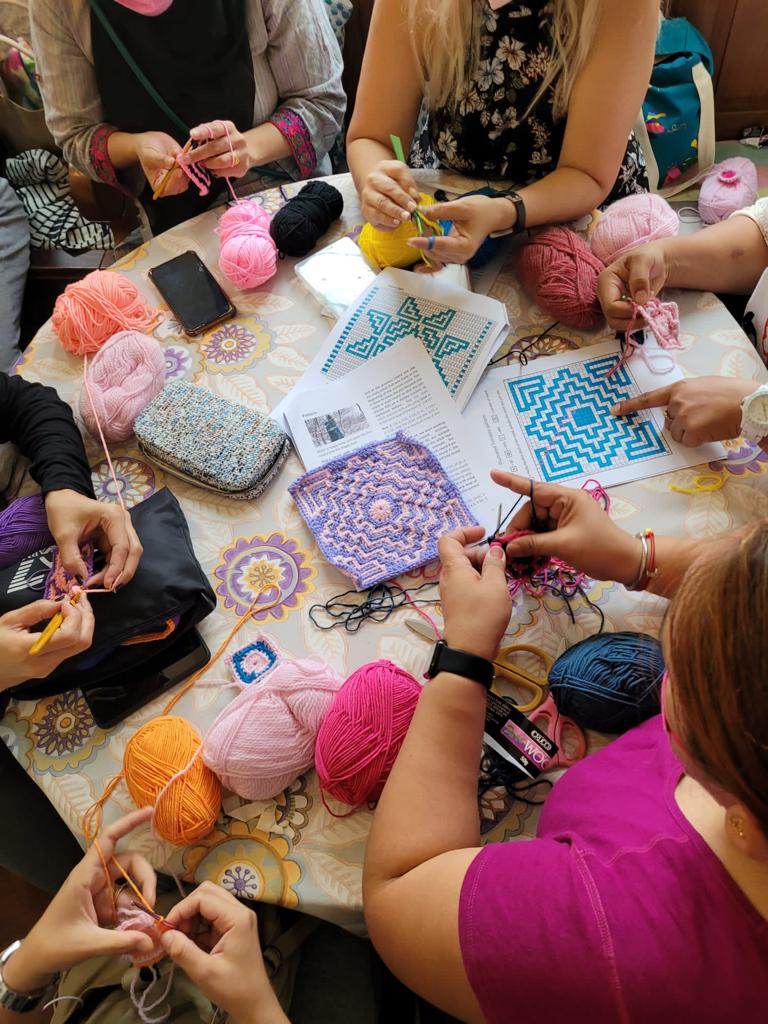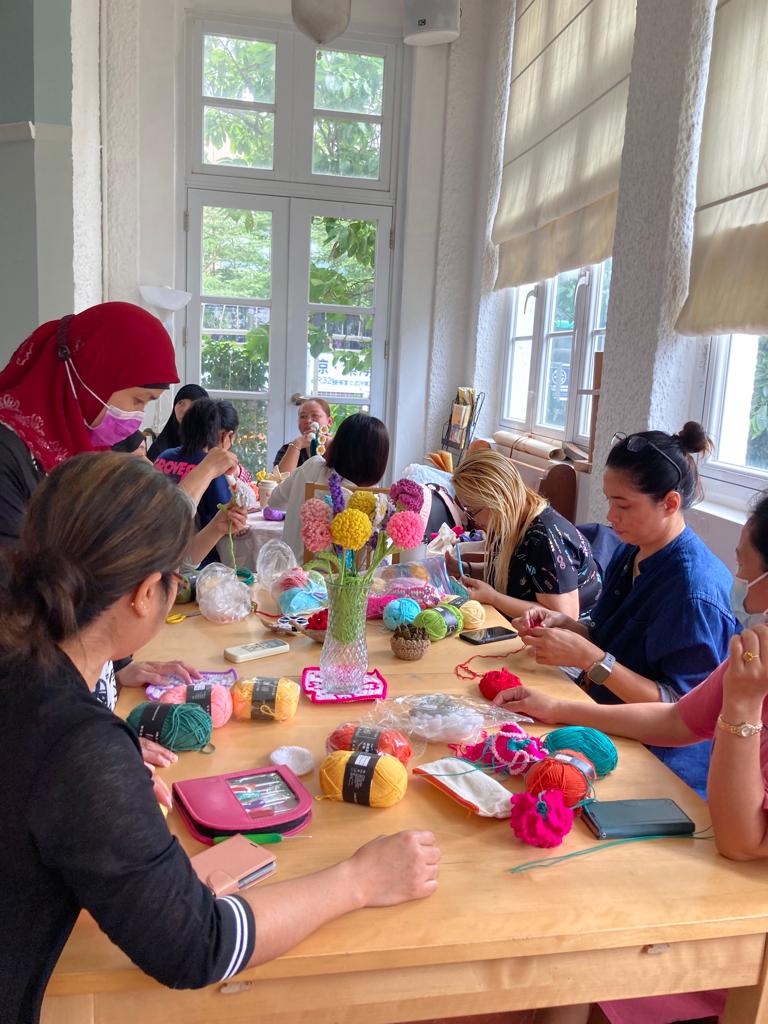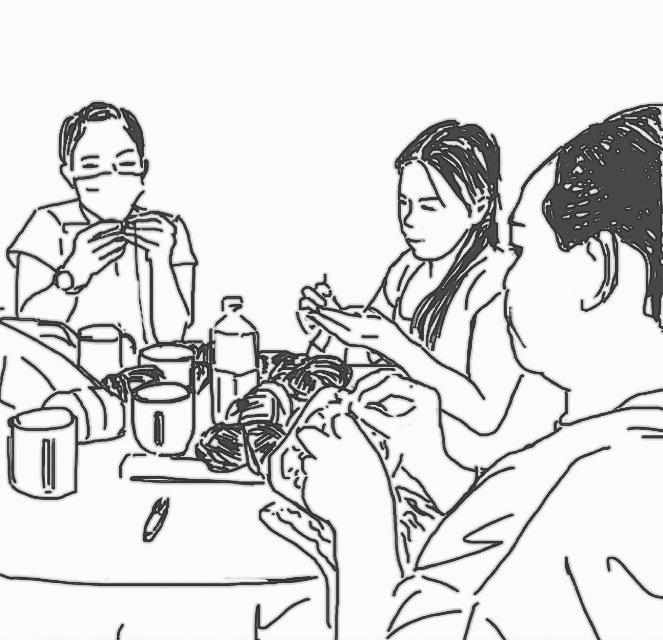Community building through crochet
Whenever the chatroom of Grassroots Future Community Group sends out registrations for gatherings, the 18 places are usually filled instantly. With the support of HER Fund, they have been holding regular crochet gatherings during the pandemic.
A Disappeared Community
The party started. The ladies chose the colour of their wool, they immersed themselves in crocheting. The quiet scene also affected their children. Children who were usually active and love to run and jump would also sit down and draw.
How crocheting has changed them? "The crochet has changed me." "Crochet makes me feel relaxed and helps me to relieve stress." "It's the first time in my life that I have learned something and been able to do it on my own. I have discovered that I can do it very well." "I can crochet different clothes for myself and my family.” "Now I am teaching other people." "During the activity with the other ladies, we talk about a lot of things. We have improved our communication." "It helps in keeping me busy, when I knit, I become relaxed and happy."
The party started. The ladies chose the colour of their wool, they immersed themselves in crocheting. The quiet scene also affected their children. Children who were usually active and love to run and jump would also sit down and draw.
How crocheting has changed them? "The crochet has changed me." "Crochet makes me feel relaxed and helps me to relieve stress." "It's the first time in my life that I have learned something and been able to do it on my own. I have discovered that I can do it very well." "I can crochet different clothes for myself and my family.” "Now I am teaching other people." "During the activity with the other ladies, we talk about a lot of things. We have improved our communication." "It helps in keeping me busy, when I knit, I become relaxed and happy."
Even though they come from different countries, races, languages and cultures, even if they occasionally have disputes, they will quickly reconcile. In addition to cherishing the opportunity to participate in activities, they also cherish each other who are also in difficulties.
"Refugees have always been severely discriminated against in Hong Kong," said Tegan Smyth, founder of Grassroots Future. Tegan, who was born and raised in Australia to a Hong Kong mother, admitted that her grandparents were also refugees. "My grandparents came to Hong Kong from mainland China in the 1950s. They did not face much discrimination because of the similar language, culture and skin color." When she was working as a lawyer in Australia, she had already started to work on supporting refugees. On the contrary, many Hong Kong people are also descendants of refugees and have no concern for the plight of refugees, and even give them negative labels.
Encountering brush-off discrimination on the subway is an everyday part of refugee life. In society or the system, they are even more ignored. Regardless of whether one is granted refugee status, the waiting time for extradition to a refugee-hosting country arranged by the United Nations can often exceed ten years. Or asylum seekers who are applying for a "non-refoulement claim", that is, refugee status. They also have no right to work and cannot work legally. Even if a child is born in Hong Kong and has the opportunity to receive free education, relying solely on the subsidy provided by the Social Welfare Department will be a heavy burden even for books and miscellaneous expenses, and he will not be able to progress to high school courses.
Tegan has held the "Table of Two Cities" event since 2016, inviting refugees from Africa, South Asia, and the Middle East to introduce their countries, cultures, and stories through food. Let Hong Kong people know more about the situation of the refugee community, and the proceeds can help fund the book expenses of refugee children. When it was registered as a charity in 2020, it was named Grassroots Future. Tegan said that grassroots represents low income in the Hong Kong context, and globally signifies mobilising people on the ground inclusive of marginalised people.
The bridge between crochet and the public
How to connect marginalized communities? Tegan tried to crochet them together.
"During the epidemic, many people learned handicrafts online to relieve stress. Refugees' own experiences are full of trauma but they are unable to seek medical treatment. The on and off epidemics have even suspended their applications and support services. Crocheting can help relieve stress and take it home It doesn’t take up too much space, so it’s suitable as an activity to support women’s body and soul. Being in a safe space can also open your heart and relieve emotional stress.” Tegan initiated the activity after herself learning crochet and realising it would be a suitable medium to build an activity on within the COVID context. However venue rental, raw material fees and transport for participants to attend was mostly self funded and not sustainable without financial support.
Grassroots Future began applying for HER Fund resources in 2021 and has received funding for two consecutive years. "HER Fund has supported us from the early stages of the project, allowing us to continue and go further. It is more of a partnership than just funding." Tegan is grateful that she can make use this resource to find Carmen Wong, who has many years of teaching experience, to serve on the project as a Projects Officer. The ladies gradually enter the public society through crocheting.
In the first stage, the ladies started from scratch and learn basic skills, from crocheting patterns to composing garments. In the second stage, they were able to set up stages, hold banquets or participate in public activities, and some women even became workshop instructors. Interestingly, some of the partner organisations were also HER Fund recipients. At the party held by HER Fund, they hit it off and started working together again. Carmen described it as a kind of magic: "HER Fund is a way of feminist practice. It is not about helping people do something, but teaching everyone how to do it. As long as you make a sound, you will get a response, and it will become louder and louder."
Women now discuss and challenge new techniques among themselves, and even help and share with each other. Carmen said this is a form of empowerment towards women, "Although refugees cannot work legally, crocheting allows their labour and productivity to be recognised, and more importantly, their abilities are seen by society."
Regarding the third phase of development, they hope to participate in more public activities, such as workshops and handicraft markets. They also hope to operate online stores, learn the market’s needs, learn some computer and Internet skills. However, Tegan admitted that due to policy changes, she did not dare to make long-term plans. "Whether they will continue to stay in Hong Kong, or worse, be repatriated, they will still have the opportunities to learn new skills, affirm their abilities, and develop their own interests."
Interviewed and written by Joan Yiu
Translated by Janie Chan




